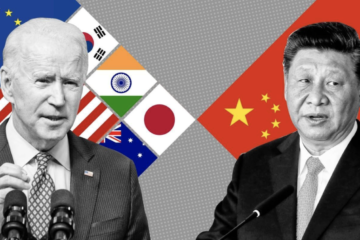On 18 November 2021, U.S. President Joe Biden reconvened the annual ‘Three Amigos’ summit with Mexican President Andres Manuel López Obrador and Canadian Prime Minister Justin Trudeau. Officially known as the North American Leaders’ Summit, the annual tradition, which was previously abandoned by the Trump administration, was revived by Biden with the intended purpose to build a stronger and more unified North American political front. However, in its failure to make substantive headway on pertinent policy matters like trade, immigration, and a rising China, the summit ended as largely a diplomatic masquerade.
The three nations discussed key concerns such as vaccine supplies and advancing global health policy during the COVID-19 pandemic, strengthening and promoting economic growth and competitiveness, combating the climate crisis, and resolving migrant and refugee issues to build a secure North America free of transnational crime and terrorism. In doing so, the summit covered a broad scope of important issues that face North America, yet some pressing subjects were absent from the agenda.
The rising number of undocumented migrants at the U.S.-Mexico border is a matter of key concern for each of the participants. There were ten commitments made on the issue, ranging from attempting to end the COVID-19 pandemic and advancing global health by supporting the Global Health Security Agenda, to facilitating equitable growth for the three countries by strengthening supply chains and developing commercial enterprises, along with greater coordination on migration and strong asylum systems. While these commitments are all steps in the right direction, they seemed to be surface level gestures and made little effort to strengthen law enforcement or make border crossing safer.
Notable issues of poor security and genuinely effective economic measures were conveniently ignored by the leaders. The International Monetary Fund (IMF) said that Central American economies shrank 6% in 2020 and it would take years to recover from the pandemic. Security concerns in the form of violence have been a major issue in the region. Homicide, gang violence, drug distributions, human trafficking and other illicit activities are some of the threats in the region. No effort was made to resolve these economic and security concerns, which are significant root causes of illegal immigration.
The summit also failed to reach any solutions to ease trade tensions between the three nations, despite major concerns like the electrical vehicle tax credits and increased duties on imports in Biden’s ‘Build Back Better’ legislation. Provisions under this legislation will “cut out Canadian-made vehicles and parts”, which will harm the North American auto industry and the US workers. Unless Canadian electrical vehicles are included in the policy, an incentive of up to 12,500 USD would be effectively lost. Mexican leaders have also said that these taxes are discriminatory, go against free trade principles, and warned of a possible trade war. This legislation may therefore have a profound impact on trilateral automobile trade.
Notably, none of the leaders attempted to address the challenge and threat posed by a rising China. Considering the current geopolitical and economic conditions faced by Western nations, it should have been especially pertinent to the U.S. to foster stronger ties with allies against China. Recent distrust towards the U.S. has resulted in some allies trying to strike a balance between the U.S. and China instead of committing to one country. As analysts at the Brookings Institute put it, “U.S. allies are not of one mind regarding their relationships with China, nor in many cases are they united with Washington about the best way to manage China’s behavior… dealing with the alliance-management problems posed by Beijing would be challenging for America and its allies under the best of circumstances.”
The summit did, however, have some positive outcomes. It called for stronger joint action against current and future health crises, especially in agreeing to share COVID-19 vaccines, as well as increased attention to address global warming, aid to Latin America and the Caribbean, and to foster growth and development in the U.S., Mexico, and Canada.
With that said, the leaders’ refusal to hold a joint press conference during the summit allowed them to elide some thorny issues. Biden was not forced to answer questions about his decision to continue with Title 42, a controversial public health policy used at the Mexican border to rapidly expel migrants based on concerns regarding COVID-19. Biden has been roundly criticized by progressives and immigration advocates for continuing to rely on it to try to keep the numbers at the border down. In August 2021, a U.S. District Court in Texas even determined the Biden administration improperly ended the “Remain in Mexico Policy”.
With Biden’s falling approval ratings, the rising number of illegal immigrants (46.6 million total as of January 2022), a global pandemic and its subsequent negative economic implications, the U.S., Mexico and Canada continue to face significant challenges from multiple angles, while China’s rising economic and geopolitical strength threatens America’s position as global hegemon. Unfortunately, the summit felt more like a diplomatic showcase and formality than an intentional solution-seeking conference.


